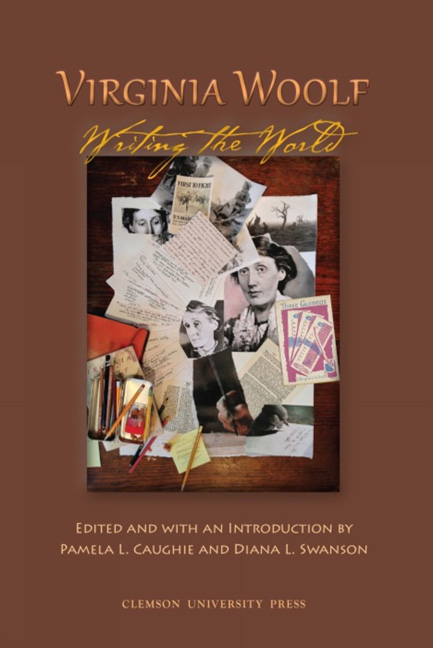Book contents
- Frontmatter
- Table of Contents
- Introduction
- Acknowledgmen
- Abbreviation
- WAR AND PEACE
- WORLD WRITER(S)
- Teaching Privileges: Three Guineas and the Cost of Global Citizenship
- From Guineas to Riyals: Teaching Woolf in the Middle East
- Fashionable Misconceptions: The Creation of the East in Virginia Woolf's Orlando
- From London to Taipei: Writing the Past in “Wandering in the Garden, Waking from a Dream” and Mrs. Dalloway
- An Estranged Intimacy with the World: The Postcolonial Woolf's Planetary Love in The Voyage Out
- “Shakespeare's Sister”: Woolf in the World Before A Room of One's Own
- Leonard Woolf: Writing the World of Palestine, Zionism, and the State of Israel
- ANIMAL AND NATURAL WORLD
- WRITING AND WORLDMAKING
- Notes on Contributors
- Conference Program
- Appendix: Virginia Woolf Conference Exhibit Items, Newberry Library
Teaching Privileges: Three Guineas and the Cost of Global Citizenship
from WORLD WRITER(S)
- Frontmatter
- Table of Contents
- Introduction
- Acknowledgmen
- Abbreviation
- WAR AND PEACE
- WORLD WRITER(S)
- Teaching Privileges: Three Guineas and the Cost of Global Citizenship
- From Guineas to Riyals: Teaching Woolf in the Middle East
- Fashionable Misconceptions: The Creation of the East in Virginia Woolf's Orlando
- From London to Taipei: Writing the Past in “Wandering in the Garden, Waking from a Dream” and Mrs. Dalloway
- An Estranged Intimacy with the World: The Postcolonial Woolf's Planetary Love in The Voyage Out
- “Shakespeare's Sister”: Woolf in the World Before A Room of One's Own
- Leonard Woolf: Writing the World of Palestine, Zionism, and the State of Israel
- ANIMAL AND NATURAL WORLD
- WRITING AND WORLDMAKING
- Notes on Contributors
- Conference Program
- Appendix: Virginia Woolf Conference Exhibit Items, Newberry Library
Summary
Virginia Woolf's Three Guineas (1938) teaches its readers to hold fashion in suspicion. Scanning men's clothing in the 1930s, Woolf's speaker notices that “every button, rosette and stripe seems to have some symbolical meaning” (24). This dress “not only covers nakedness, gratifies vanity, and creates pleasure for the eye,” she maintains, “but it serves to advertise the social, professional, or intellectual standing of the wearer” (26). There is indeed a thread, fine though it may be, tying the “sartorial splendors of the educated man” (26) to the peacocky labels of his fashion, to the “emotions which, as we need scarcely to draw on biography to prove, nor ask psychology to show, have their share in encouraging a disposition toward war” (27). These seemingly innocuous bonnets, buttons, and badges draw lines, demarcate notoriety, and incite envy. War has its material base. Thus, Three Guineas takes care to demonstrate that “both sexes have a very marked though dissimilar love of dress”: a diff erence arising from sex that shrouds commonality through the “hypnotic power of dominance” (177). I will return to this power later, but now I shift registers slightly. For this paper will not assess the fashion of educated men: that battle is, I fear, quite lost. It will dilate, rather, on what is fashionable in the academy: not on what intellectuals wear as much as on the threads that, at whatever historical moment, weave together their cogitations. Style has its place there, too, and it is hardly an innocuous one. Woolf's analysis, in this mode, not only underscores the need to think critically about global injustices but also problematizes the privileges of higher education itself.
In this essay, I focus on the academic fad closest to my heart—that nebulous neologism, “global citizenship”—and reflect on my experience teaching Three Guineas to two cohorts of (largely privileged) seniors in Lehigh University's Global Citizenship Program. My argument first examines the various academic discussions concerning global citizenship education before turning to an analysis of how Three Guineas productively complicates students’ engagement with communities both local and global. I then assess sympathetic attachment and the political benefits of such good feeling.
- Type
- Chapter
- Information
- Virginia Woolf: Writing the World , pp. 92 - 98Publisher: Liverpool University PressPrint publication year: 2015



